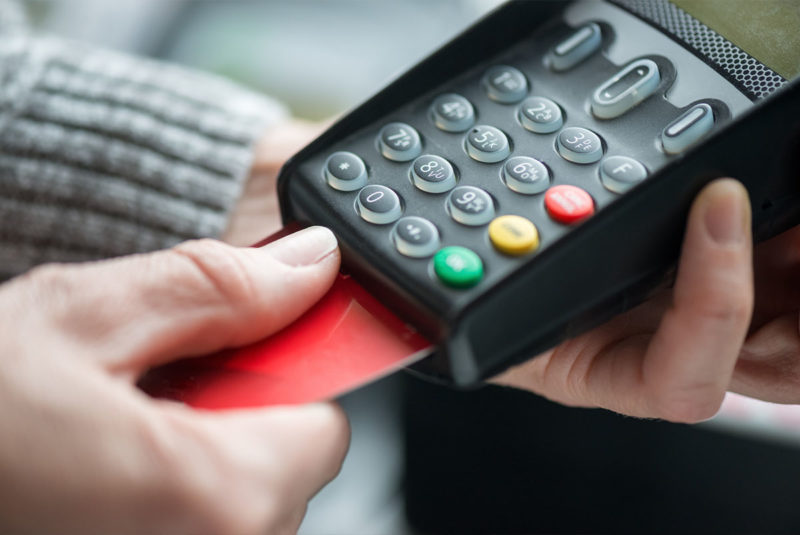A stolen credit card may sound like a nightmare. But as long as you notice the lost card and act quickly, this situation should be no cause for alarm.
If your credit card is used without your permission, your liability for fraudulent charges is limited by law. Plus, the major credit card networks all have $0 fraud liability policies, meaning that you won’t have to pay for unauthorized charges as long as you report the problem right away.
So, if you’ve just realized that your credit card is lost or stolen, don’t panic. There are some simple steps you can take to remedy the problem.
Report Your Card As Lost or Stolen
The first thing you should do when your credit card goes missing is report the lost card to your card issuer. If you think your card has been stolen and used for fraudulent purchases, you may need to dispute the charges with your card issuer as well.
It’s best to report a lost credit card as soon as you notice it’s missing, though some credit card issuers are more forgiving than others. You can call the number on the back of your card to contact your issuer. You may also need to follow up with a certified letter, especially if you need to dispute a charge.
Since your card is gone, here is a collection of popular card issuers and networks. The cheat sheet contains the phone numbers you need to report your card as lost and the individual lost/stolen card reporting websites as well.
Credit card issuer contact information
| Credit Card Issuer | Website | Phone Number |
| Bank of America | Bank of America Lost/Stolen Card Reporting | 1-800-732-9194 |
| Barclays | Barclays Security Center | 1-866-928-8598 |
| Capital One | Capital One Lost/Stolen Card Reporting | 1-800-227-4825 |
| Chase | Chase Fraud Resources Page | 1-800-432-3117 |
| Citi | Citi Contact Security Center | 1-800-950-5114 |
| USAA | USAA Report Fraud | 1-800-945-6759 |
Payment processor contact information
| Payment Processor | Website | Phone Number |
| Visa | Visa Lost/Stolen Card Reporting | 1-800-847-2911 |
| Mastercard | Mastercard Support Page | 1-800-627-8372 |
| American Express | American Express Lost Card/Account Help | 1-800-528-4800 |
| Discover | Discover Security Center | 1-800-347-2683 |
Credit bureau contact information
A stolen credit card doesn’t automatically lead to identity theft. However, if your wallet is stolen and your Social Security card was inside (not something we recommend), report the fraudulent use to the credit reporting agencies. You may also want to freeze your credit reports and create a fraud alert as a precaution.
| Credit Bureau | Website | Phone Number |
| Experian™ | Experian™ Credit Fraud Resources Page | 1-888-397-3742 |
| Equifax® | Equifax® Credit Fraud Resources Page | 1-888-378-4329 |
| TransUnion® | TransUnion® Credit Fraud Resources Page | 1-833-395-6938 |
What Happens After I Report My Lost Card?
After you report your card as lost or stolen, your issuer will cancel the card and then mail you a new one with a new account number.
The next time your card issuer updates your information with the credit bureaus, it may choose to report the change in one of two ways:
- It may report your old credit card as a closed account (lost/stolen) and report a “new” account (aka tradeline) to the credit bureaus with your new card number.
- It may update your tradeline to reflect the new account number it issues you on your replacement card. All other information remains the same on your report.
When a reissued card could affect your credit report
If your reissued card is reported to the credit reporting agencies as the same original tradeline (just with an updated number), your credit score shouldn’t change. But if a brand new tradeline is added to your reports and the original tradeline is closed as a lost/stolen card, that could be a different story.
When a new tradeline is reported to the credit bureaus for a replacement card, the account open date should be the same on the “new” account as it was on the original card. So, if you opened your original card in 2009, the reissued account should reflect the same open date.
In a strange twist, this “new” tradeline might give your credit scores a boost. If your lost card was opened several years ago, adding what is essentially a duplicate of that account to your credit reports might increase your average age of credit (a factor that influences 15% of your FICO® Score). On the other hand, if your lost card is newer, adding another tradeline with a more recent open date might lower your average age of credit instead.
In rare cases, however, a credit card issuer might report the replacement card as a new account, with a new open date. If this occurs, it would likely decrease your average age of credit and possibly your credit score by extension.
To be safe, keep an eye on your credit reports after your card is reissued. Should the reissued card show up as an account with a brand new open date, contact your credit card issuer to see if it can fix the problem.
The Fair Credit Billing Act Limits Your Liability
Under the Fair Credit Billing Act (FCBA), cardholders are protected from having to pay the full cost of fraudulent credit card charges.
This federal law limits your liability to $50, as long as you report fraudulent credit card activity within 60 days after receiving a statement with unauthorized charges. In other words, $50 is the maximum amount you could owe the bank if someone steals your card and uses it without your permission before you’ve reported the card stolen.
If you report your card stolen before any charges are made, the FCBA says you’re not responsible for any of the charges. You also have no liability if someone stole your credit card number, but not the actual card.
Most credit card companies offer $0 liability across the board, in the interest of customer service. If your card issuer offers this benefit, you won’t owe any money for unauthorized charges, even if the charges were made before you reported the card stolen. But you must contact the card issuer to report your card as lost or stolen as soon as you notice the problem.
Remember, debit cards do not offer the same legal fraud protections as credit cards. With debit cards, if you fail to report a lost card within two days, you could be liable for up to $500 in fraudulent charges. Wait more than 60 days to report unauthorized debit card transactions and you could be responsible for all the charges. This is just one more reason why it’s typically best to pay for purchases with a credit card.
Save Some Hassle With Virtual Credit Card Numbers
Virtual credit card numbers are a bit like digital copies of your credit card.
You can make virtual card numbers to use for online shopping, which use different account information than your physical card. If any of your virtual card numbers are compromised you can easily cancel them and create new ones, without having to report your card as stolen.
Likewise, in some cases, if you report your physical card as lost or stolen you won’t need to change your virtual card numbers. So if you were paying for a Netflix subscription with a virtual card, for example, you wouldn’t need to re-enter your information after getting a new credit card in the mail. You’d just continue to use the same virtual number. Virtual credit card numbers can be pretty handy for recurring payments, especially if you have a lot of subscription services or online payment accounts with merchants.
Three big credit card issuers offer virtual numbers for cardholders:
- Apple Card (issued by Goldman Sachs)
- Capital One
- Citi
However, only two issuers allow you to keep the same virtual cards if you report your physical card as lost or stolen: Goldman Sachs and Capital One. With Citi, if you report your card as lost or stolen all of your virtual cards will be canceled, and you’ll need to create new ones.
The Short Version
- Reporting your missing card to the issuer is the first step, but, if fraud occurs, you may need to contact the credit bureaus and other agencies
- After you report your card as lost or stolen, your issuer will cancel the card and then mail you a new one with a new account number
- Under the Fair Credit Billing Act (FCBA), cardholders are protected from having to pay the full cost of fraudulent credit card charges




